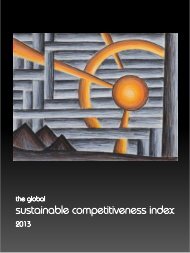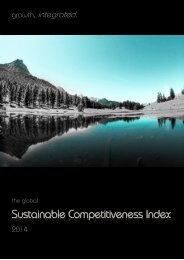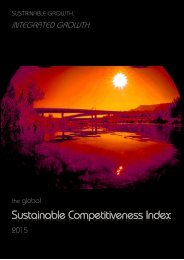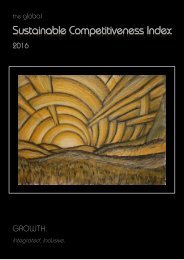Global Competetiveness Report
Create successful ePaper yourself
Turn your PDF publications into a flip-book with our unique Google optimized e-Paper software.
Country Rankings<br />
Sustainable Innovation & Competitiveness<br />
Countries listed amongst the lower ranks of<br />
the sustainable innovation & competitiveness<br />
list are likely to face obstacles in achieving<br />
sustainable and sustained economic growth.<br />
Some of the ingredients of a successful<br />
sustainable development implementation,<br />
however, require other factors in order to kick<br />
start development (e.g. factor A is a<br />
requirement to achieve B, while A is required<br />
as a prerequisite to achieve B. In such a<br />
situation, A cannot be achieved due to the<br />
absence of B, and B cannot be achieved<br />
because of the lack of A). Significant cooperated<br />
efforts on a wide front of issues and<br />
political will for implementation is required in<br />
order to escape this cycle, a considerable<br />
task for a country. However, over the last<br />
three or four decades some countries in Asia<br />
have proven that such achievements are not<br />
impossible (for example South Korea,<br />
Malaysia, China).<br />
Amongst the current (and future) obstacles<br />
facing countries characterized by low<br />
sustainable competitiveness are:<br />
• Limited availability and quality of<br />
education (number of students per<br />
teacher, teachers education & motivation,<br />
facilities and materials), leading to limited<br />
R&D capabilities and a lack of highly<br />
qualified workforce, in turn limiting<br />
economic opportunities and development<br />
• Insufficient R&D spending, limiting<br />
opportunities to develop value-added<br />
industries<br />
• Lack of modern transport and<br />
communication infrastructure, leading to<br />
limited and costly access to markets<br />
• Limited health and sanitation infrastructure<br />
Many of the above obstacles are interlinked<br />
and therefore challenging to overcome.<br />
Sustainable Innovation<br />
Country Rank Score<br />
Romania 45 46.2<br />
Oman 46 46.1<br />
Turkey 47 45.9<br />
Bahrain 48 45.0<br />
Uruguay 49 44.7<br />
Colombia 50 44.6<br />
Poland 51 44.5<br />
Saudi Arabia 52 44.3<br />
Algeria 53 43.9<br />
Bulgaria 54 43.5<br />
Tunisia 55 43.4<br />
Uzbekistan 56 43.4<br />
Greece 57 43.3<br />
Latvia 58 43.2<br />
Guyana 59 43.2<br />
Jordan 60 43.1<br />
Argentina 61 43.0<br />
Iran 62 43.0<br />
Sri Lanka 63 42.8<br />
Serbia 64 42.7<br />
Venezuela 65 42.5<br />
Mauritius 66 42.2<br />
Ecuador 67 42.1<br />
Paraguay 68 41.7<br />
Slovakia 69 41.1<br />
Kyrgistan 70 40.9<br />
Georgia 71 40.5<br />
Mongolia 72 40.4<br />
Lebanon 73 40.3<br />
Kazakhstan 74 40.3<br />
Peru 75 40.1<br />
Brunei 76 40.1<br />
Kuwait 77 40.0<br />
Kosovo 78 39.9<br />
Cuba 79 39.6<br />
Bosnia and Herzegovina 80 38.9<br />
South Africa 81 38.3<br />
Malaysia 82 38.2<br />
Bhutan 83 38.1<br />
Suriname 84 37.8<br />
Tajikistan 85 37.5<br />
Ukraine 86 37.3<br />
India 87 37.3<br />
Syria 88 37.2<br />
The <strong>Global</strong> Sustainable Competitiveness Index<br />
51








